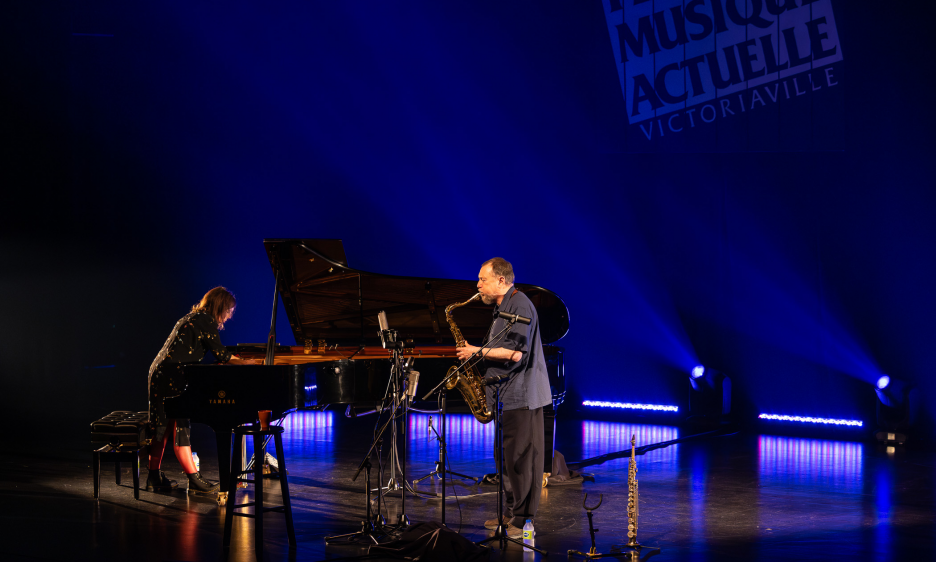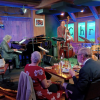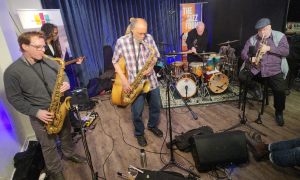Home » Jazz Articles » Live Review » Festival International de Musique Actuelle de Victoriaville 2024
Festival International de Musique Actuelle de Victoriaville 2024

Courtesy Martin Morissette
Various Venues
Victoriaville, Quebec, Canada
May 16-19, 2024
The 40th edition of the Festival International de Musique Actuelle de Victoriaville, held May 16-19, was marked by the big change of artistic directors from founding director Michel Levasseur to Scott Thomson, former artistic director of the Guelph Jazz Festival. On the other hand, the programming itself stayed true to the history of the festival, with perhaps a stronger emphasis on acoustic and electroacoustic music than on electronic and avant-rock as seen in the past. That said, the quality of the music presented was generally very high, with transcendent performances from Nate Wooley's Columbia Icefield project, the duo of pianist Sophie Agnel and saxophonist John Butcher, the trio of Joëlle Léandre, Mat Maneri, and Craig Taborn, and the Dwarves of East Agouza; in a program of 19 concerts, this is an exceptional number, considering that performances by the Quatour Bozzini, Sakina Abdou, Amma Ateria, the Natural Information Society, and Splendide Abysse were also very close to that level.
The festival commenced on Thursday, May 16 with a concert of a piece titled Basileus by Montreal composer Pascal Germain-Berardi that exemplified grandiosity both in the size of the ensemble (50+, including a small army of guitars and the Growlers Choir) and in the music itself, which in its bombast signified a most non-subtle logical end-point of death metal and a Wagnerian quasi-mythic approach. The following performance by Montreal's Quatour Bozzini of composer Jürg Frey's "String Quartet No. 4" was in sharp contrast, a minimalism that demanded close listening and rewarded attentiveness to small variations and minute detail. The midnight show by French-born, Quebec-based bassist Stephane Diamantakiou's project "Le Double" was a curious but ultimately less than interesting take on post-Bitches Brew Miles Davis and middle-of-the-road rhythm and blues.
The Friday program kicked off with the first of the festival's three solo acoustic performances at 1 pm in the Église Saint-Christophe d'Arthabaska, this one by French saxophonist Sakina Abdou, who made good use of the church's acoustics with alto and tenor saxophones. This was a first-ever Canadian performance by Abdou, and the audience responded warmly to her openly happy music. Amma Ateria is a San Francisco-based electronic artist who turned her experience of a concussion into a composition of the same name, which had an evocative, narrative nature accompanied by black and white videos of what appeared to be shifting cloud formations, apt for the subject.
The quartet Splendide Abysse is led by Montreal bass clarinetist Philippe Lauzier, whose music is both subtle and detailed, with engaging timbral variations and close listening and response by the musicians. Their set at 8 pm on Friday was quite satisfying. Joshua Abrams plays the Moroccan three-stringed guimbri and leads the shifting membership of the Natural Information Society, this time an octet in a performance that insisted on heavy grooves and naturalistic interplay amongst the musicians. The only disappointing concert of the day was the midnight performance by the Dutch avant-rock trio Bazip Zeehok, whose somewhat intimate rock and spoken word could not overcome the limitations of the room.
Canadian trumpeter Nicole Rampersaud released Saudade on the Ansible Editions label in 2023, and this music formed the basis of her 1 pm solo church performance on Saturday, which was a display of virtuosity and heart. Particularly effective was Rampersaud's rapid trills in the higher registers of her trumpet. The show that followed at 3 pm was one of the undisputed highlights of the festival, a duo of French pianist Sophie Agnel and British saxophonist Joh Butcher, who recorded La Pierre Tachée, released in 2022. For the most part, Agnel worked the strings of the prepared piano, while Butcher explored extended harmonics in a way that was both intellectually and viscerally satisfying, as the sounds from his saxophone reverberated against and within the body of the piano. The interaction between the two musicians was quicksilver incisive, with not a false step.
At 5 pm, the Bill Orcutt Guitar Quartet took pretty much a jam band approach, with pieces built around grooves laid down by Orcutt or Shane Parish and interplay amongst the musicians, rounded out by Ava Mendoza and Wendy Eisenberg. Roscoe Mitchell performed solo on bass and soprano saxophones at 8 pm, and although the 83-year-old has been physically diminished by age, his creative mind still works. The pieces he played had a wistful narrative aspect to them that carried great emotional resonance.
The trio of Joëlle Léandre, Mat Maneri, and Craig Taborn put on a clinic in improvisation, the communication among the three at the highest level. Curiously, most of the pieces featured interplay between Taborn and Léandre, with Maneri, except for a gorgeous solo in the first piece, preferring to lay back to a great extent. Léandre's solo near the end of the set was affecting and satisfying.
Finally, the Dwarves of East Agouza, a trio comprised of Sam Shalabi on guitar, Alan Bishop on electric bass and alto sax, and Maurice Louca on electronics, took the audiences to places they hadn't imagined in their 70-minute midnight set of psychedelic free jazz and rock-influenced music. The turning point that lifted the performance above the good to the transcendent came about halfway through when Bishop got up and did a humorous dance that raised the level of unpredictability. Bishop also played a hands-free alto sax solo and rapped in what sounded like a made-up language. Louca was a monster on electronics, providing beats and colors that provided a base for Shalabi and Bishop. This concluded one of the best single days at FIMAV seen in 25 years, and everyone walked out of the room on a high.
On the final day of the festival, saxophonist Don Malfón was on tap at the church, where he presented a novel approach to saxophone improvising, using various devices, including various sizes of tin cans as mutes with invention and subtlety. The performance by trumpeter Nate Wooley's Columbia Icefield was an emotional tribute to Wooley's mentor Ron Miles, who passed in 2022. Of particular note was the reference to Miles' work with Bill Frisell, as the quartet (Wooley, Ava Mendoza, Ryan Sawyer, and Susan Alcorn) echoed the Americana of albums like Frisell's Blues Dream (Nonesuch Records, 2001). The interplay between Wooley and Mendoza was paramount in this vein. Sawyer's drumming was rock-solid, and Alcorn, despite being somewhat buried in the mix, contributed to the atmospherics. Wooley was tearing up as he introduced the music at the start of the concert, and the music brought tears to many in the audience.
The Kavain Wayne Space/XT Trio is comprised of Kavain Wayne Space on turntables and electronics, Seymour Wright on alto sax, and Paul Abbott on drums. The improvisation was hugely satisfying, but it carried on for almost 90 minutes, which was about 35 minutes too long. The festival concluded with two evening performances that saw the audience divided in its reactions. Alto saxophonist Steve Lehman's project Sélébéyone features two rappers, Gaston Bandimic and HPrizm aka High Priest, along with Lehman on sax and laptop, soprano saxophonist Maciek Lasserre, and drummer Damion Reid. Whatever the merits of the music itself, the sound mix was a problem, with the laptop and drums far too loud, which rendered the listening experience uncomfortable to these ears and body.
The festival closed with a 90-minute set by Norwegian guitarist Kim Myhr's Sympathetic Magic, an 8-piece featuring lots of guitars and drums along with keyboardist Eve Risser. The music was shimmeringly pretty, with extended grooves that tended to stay in one place, sounding like introductions to pieces that never really turned into full-blown compositions, a kind of maximalist minimalism that had much of the audience dancing joyfully by the end of the concert.
So concluded the 40th FIMAV, which could be regarded as a triumph for new artistic director Thomson. Attendance at the festival was down from last year, due in part to the fact that John Zorn, always a Victo favorite who draws well, did not appear. However, the attendance might be due as well to a slight downturn in the economy, as even the Victoriaville that is not involved in the festival seemed much quieter than usual. What the festival did have, as mentioned earlier, was a good number of superlative performances, which bodes well for the direction of this landmark event.
Tags
Live Review
Mike Chamberlain
Canada
Montreal
Festival International de Musique Actuelle de Victoriaville
nate wooley
Sophie Agnel
John Butcher
Joelle Leandre
Mat Maneri
Craig Taborn
Dwarves of East Agouza
Quatour Bozzini
Sakina Abdou
Amma Ateria,
Natural Information Society
Splendide Abysse
Philippe Lauzier
Joshua Abrams
Bazip Zeehok
Nicole Rampersaud
Bill Orcutt Guitar Quartet
Shane Parish
Ava Mendoza
Wendy Eisenberg
Roscoe Mitchell
Sam Shalabi
Alan Bishop
Maurice Louca
Don Malfon
Ron Miles
Bill Frisell
Ryan Sawyer
Susan Alcorn
Kavain Wayne Space/XT Trio
Kavain Wayne Space
Seymour Wright
Paul Abbot on drums
Steve Lehman
Sélébéyone
Gaston Bandimic
Hprizm
Maciek Lasserre
Damion Reid
Kim Myhr
Eve Risser
john zorn
PREVIOUS / NEXT
Craig Taborn Concerts
Mar
27
Fri
Support All About Jazz
 All About Jazz has been a pillar of jazz since 1995, championing it as an art form and, more importantly, supporting the musicians who make it. Our enduring commitment has made "AAJ" one of the most culturally important websites of its kind, read by hundreds of thousands of fans, musicians and industry figures every month.
All About Jazz has been a pillar of jazz since 1995, championing it as an art form and, more importantly, supporting the musicians who make it. Our enduring commitment has made "AAJ" one of the most culturally important websites of its kind, read by hundreds of thousands of fans, musicians and industry figures every month.



























